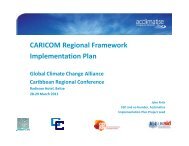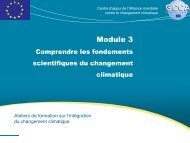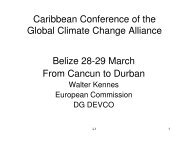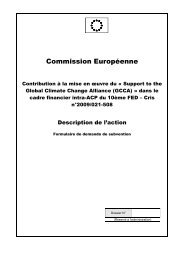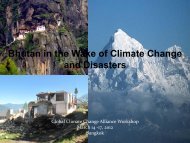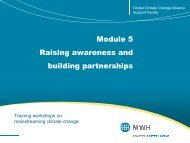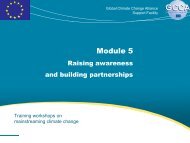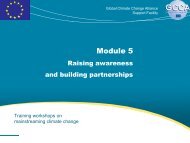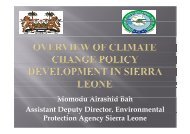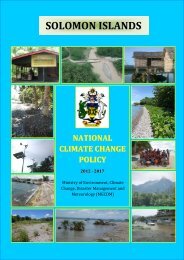Rwanda Green Growth Strategy 18nov11 - Global Climate Change ...
Rwanda Green Growth Strategy 18nov11 - Global Climate Change ...
Rwanda Green Growth Strategy 18nov11 - Global Climate Change ...
Create successful ePaper yourself
Turn your PDF publications into a flip-book with our unique Google optimized e-Paper software.
Detailed Programmes of ActionProgramme 4: Integrated Approach to Land Use Planning andSustainable Land Use ManagementResponsible Stakeholders (lead in bold)Department of Lands and Mapping under RNRA, MINIRENA, Land Commissions, Land Bureaux,MINAGRI, MINALOC, MOHSummary of Programmes and ActionsAdapting to climate change and achieving a low carbon growth is contingent on ensuring land tenuresecurity and instigating a robust integrated framework for development planning and sustainable landmanagement. Tenure gives landowners responsibility to manage their land in accordance to planning codes,access to equity markets, and the economic incentive to improve the asset. To achieve these goals,improved land information management is essential. Action 1: Integrated Approach to Planning and Sustainable Land Use ManagementCompetition for land will continue to grow with increasing pressures from agriculture and livestock.Encroachment on sensitive areas will persist until land reforms are completed. <strong>Rwanda</strong> will implement arigorous planning and zoning regulatory framework to manage the changing demands on land. The keysteps in achieving an integrated framework for land use planning and sustainable land use management willbe to promulgate the land use planning law; elaborate the District Detail Plans (DDPs) under the NationalLand Use and Development Master Plan; provide integrated land use planning decision support; andemploy Strategic Environment Assessments (SEAs) for key Development Zones and ecologically sensitiveareas.Action 2: <strong>Rwanda</strong> Spatial Data Infrastructure: National Land Information Management and InformationSharing and Access Policy<strong>Rwanda</strong>’s next priority will be to develop National Spatial Data Infrastructure (SDI). A plan is urgently requiredto manage the nation’s land information resources and to identify the fundamental datasets required tomanage land and water resources, monitor land use and environmental change, support economicdevelopment, and enable <strong>Rwanda</strong> to better plan, monitor, and respond to the impacts of climate change.The <strong>Rwanda</strong> Natural Resources Authority (RNRA) offers an opportunity to spur improved management ofnatural resource datasets. Other sectors maintain key national data sets that also must be managed, madeaccessible, and kept up to date. To develop its SDI, <strong>Rwanda</strong> will establish a National Information Sharingand Access Policy, a National SDI <strong>Strategy</strong>, a detailed national features map, and ongoing monitoring of landuse and environmental change. Action 3: GIS/ICT Innovation throughout Government, Districts and Implementing AgenciesLand Use Planning and Sustainable Land Management demands integrated analysis of various datasetsincluding land use, zoning, administrative boundaries, roads, population and health, environment, soils andgeology, hydrology, and elevation. By harnessing GIS and ICT technologies, <strong>Rwanda</strong> will enable nationalgovernment and district offices to avoid uncontrolled development, increased energy demand andemissions, inefficient transport systems, over burdened water and sanitation systems, environmentaldegradation and loss of biodiversity, food insecurity, health impacts and reduced livelihoods. In order tofoster professionals with the skill sets required to understand and respond to these demands, <strong>Rwanda</strong> willbuild a GIS user community, and a District Planning Capacity program. Planning partnerships will beestablished between national and district government offices to ensure a common service deliveryframework. Such technology diffusion will build on the National ICT Plan (NICI III) and advance Governmentto Government (G2G), Government to Business (G2B), and Business to Business (B2B) ICT components ofa knowledge based economy.62Government of <strong>Rwanda</strong>



